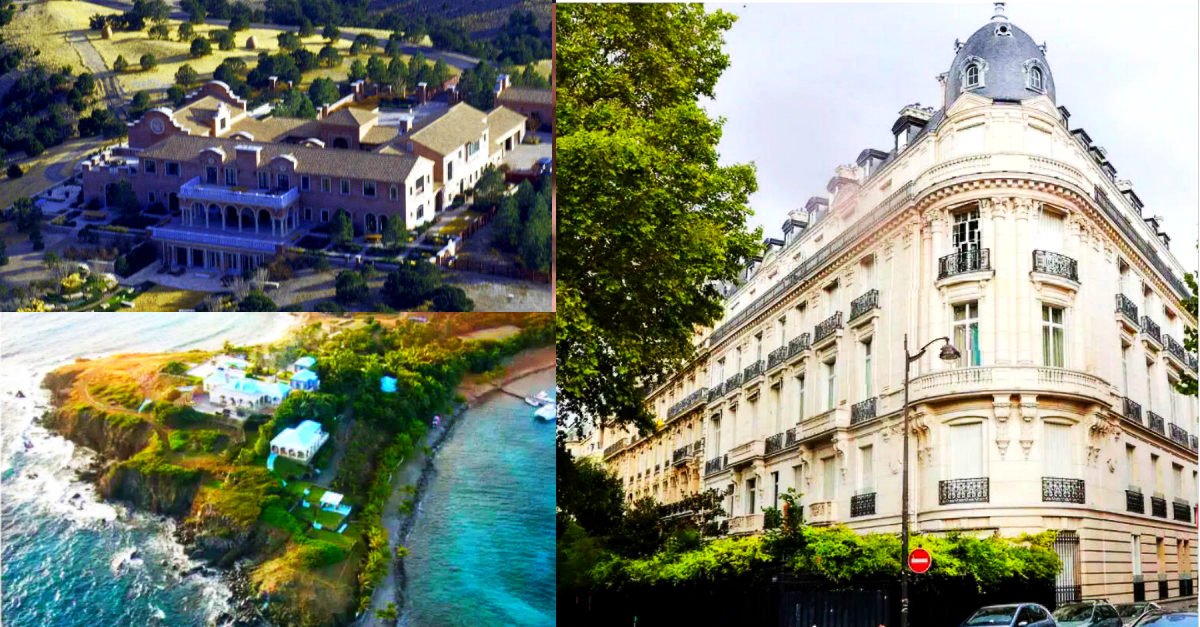
The executors of Jeffrey Epstein’s estate are out of money (Epstein’s residences in the Virgin Islands, Paris, and New Mexico from SDNY). They have filed an emergency order to pay the bills.
The executors of Jeffrey Epstein’s estate claim they can no longer perform their administrative duties and have not paid a bill in months because of the liens put in place by U.S. Virgin Islands Attorney General Denise George.
In an emergency motion obtained by Law&Crime, lawyers for Darren Indyke and Richard Kahn are now asking the court to issue an order instructing George to release $1.78 million from Epstein’s First Bank account.
These liens have been the source of much contentious debate between the executors and George, both in court filings and during court appearances.
The motion accuses the attorney general of “impeding the lawful administration of the Estate and jeopardizing the value of the Estate’s assets by sitting on an Estate request for a release of funds.”
According to the motion, the money is needed to cover the estate’s expenses for the first three months of this year and legal bills from October and November of last year.
Lawyers for the executors claim that the 12-week delay in getting these funds has resulted in service providers refusing to work for the estate, vendors charging late fees as payments drag on, and some companies are now declining to work with the estate.
“The harm to the Estate from the Government’s refusal to abide by its promises is growing daily. The Estate has been unable to pay its bills for months, is incurring late fees on those past due invoices, and faces threats of and the actual termination of services at its properties,” reads the emergency motion filed on Friday.
“The Estate will soon be unable to maintain its properties, defend civil litigation or settle pending claims, fulfill regular administrative duties, and pay the remaining fees and costs of the Epstein Victims’ Compensation Fund. ”
Emails submitted with the emergency motion reveal that the estate on Dec. 16 first asked for a partial lien release of $1,730,990.10 in an email to Deputy Attorney General Carol Jacobs.
“Specifically, the Estate requests funds to cover $1,289,974.43 in legal fees during October and November and funds to cover $76,332.25 in third-party indemnification of legal fees,” writes estate attorney Marc Weinstein, of the law firm Hughes Hubbard & Reed.
In that first email, Weinstein also explains that “the sale of certain Prytanee artwork in Paris (for a total of €144,819.53)” has left the estate with enough money to cover the costs and expenses related to the upkeep of that apartment during the first quarter.
That leaves $364,683.42 for the estate’s two private islands, ranch, and the storage of Epstein’s art.
A few days later, George’s office wrote back with a few questions. A lawyer working with the attorney general asked why it would cost $212,000 to keep the New Mexico ranch running for three months. She also wondered why the cost to store art would be $52,000, and wanted to know when those properties in Paris and New Mexico were going to sell.
She also commented on the estate’s big sale in Paris.
“The email accompanying the request indicates that artwork totaling more than 144,000 euros was sold, covering the Paris expenses. The Paris expenses have traditionally run only around $100,000, or € 94,000,” wrote Carmen Sessions Scott.
“Assuming excess proceeds exist from the sale, please provide when those will be deposited. If the Paris expenses were for some reason much higher during this period, please explain.”
She closed out the email by adding: “Please also keep us apprised of the sale of any other Estate assets.”
Weinstein followed up four times with George’s office before getting a response on Jan. 28.
“The delay and lack of response to our inquiries appear to be without justification and impair the Co-Executors’ ability to administer the Estate,” wrote Weinstein in that email.
“We request that the Government issue the release on Monday so that the Co-Executors can administer the Estate. If there is a reason that the lien cannot be released on Monday, please provide us with the explanation.”
Chief Deputy Attorney General Carol Thomas responded six minutes later, writing: “We received your request and are reviewing it internally.”
That is the last response Weinstein got, despite sending three additional emails.
That was the only response executors got, save a Jan. 28 email that read: “We received your request and are reviewing it internally.
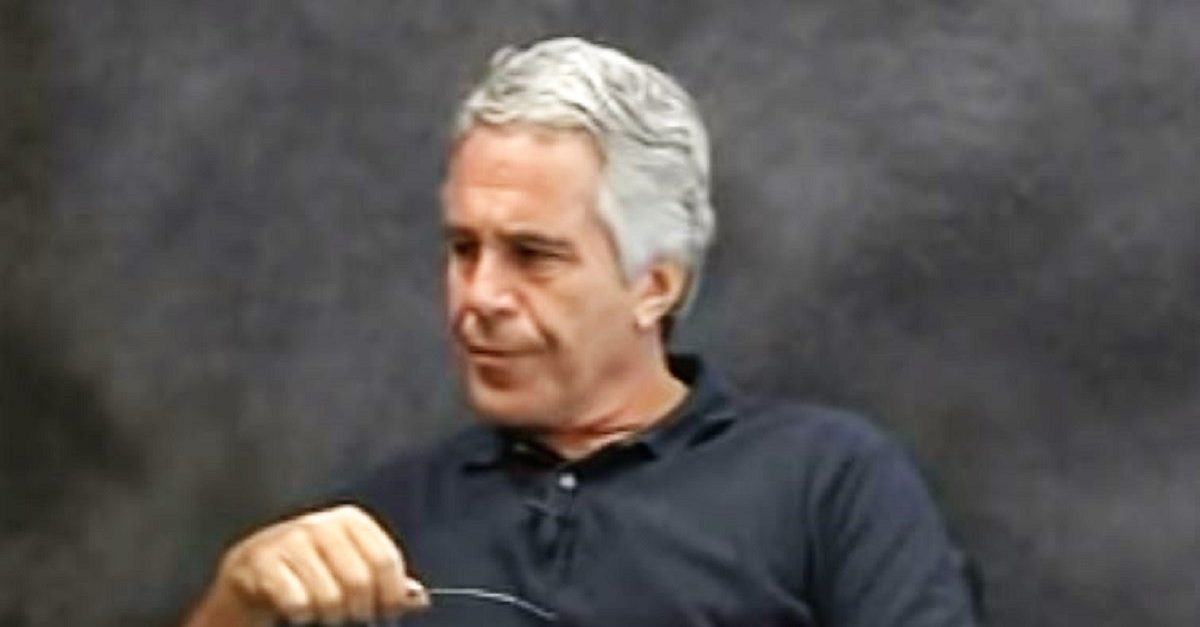
Epstein controlled a $600 million estate at the time of his death. (image via YouTube)
Those emails submitted by the executors make their frustration clear, but there are a number of reasons why George has been hesitant to free up money for the estate.
Lawyers for the executors discussed why they need as much money as they do to manage the New Mexico ranch:
Among other such examples, counsel for the Co-Executors explained that the company responsible for providing propane to heat the Estate’s New Mexico property was threatening to stop upcoming deliveries (in the middle of winter) without payment (a threat that has now become reality), and necessary HVAC, critical repairs and maintenance necessary for that property could not be done unless and until the Government released Estate funds.
A review of the sixth quarterly accounting statement obtained by Law&Crime reveals that in the first three months of 2021 the estate spent $54,427.92 on propane and oil, with over $45,000 of that money going to purchase propane.
That means the estate purchased over 19,000 gallons of propane in just three months, given the cost of propane at that time.
Even if you add the $29,249.86 the estate paid to Central New Mexico Electric in the first three months of last year along with the $42,732.34 for property management services and reimbursements as detailed in the quarterly accounting statement, the total comes to $126,409.865.
That is almost $100,000 less than the executors requested from the district attorney.
There are also questions about the art owned by the estate.
The sixth quarterly accounting document valued Epstein’s art collection at $338,804. The estate wants $52,000 to store that art, according to the emergency motion. But according to the quarterly statement, a year ago, the estate paid just $37,199.80 for art storage to Pall Mall Art Advisors and Atleier 4.
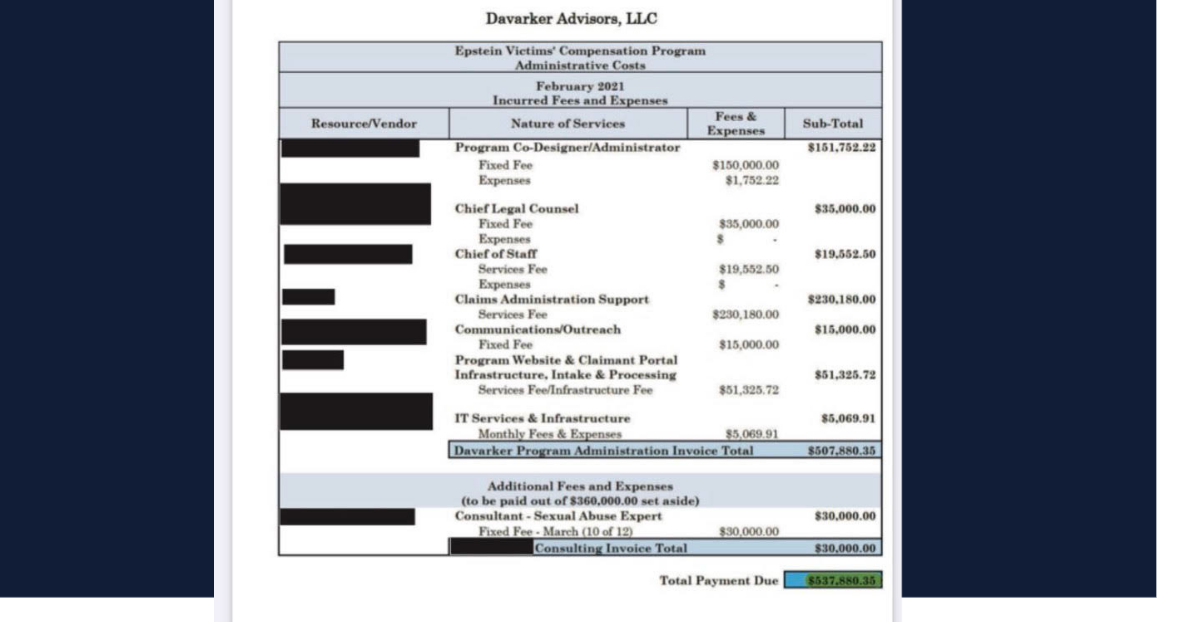
The $50,549.71 that Weinstein requested at one point from George’s office is far less than the $1,452,544.76 in operating expenses paid to the administrator and her team between January and March of last year (request from 2021 above)
In the sixth quarterly statement, the estate had over $4.5 million in legal fees, including $1,000,679 to Hughes Hubbard Reed, $735,987 to McLaughlin Stern, $707,565.64 to Troutman Sanders, and $252,171.82 to Kellerhals Ferguson Kroblin.
And while it is unclear what the Victim’s Compensation Fund is billing the estate given the operation last summer, the request for $50,549.71 that Weinstein requested at one point from George’s office is far less than the $1,452,544.76 in operating expenses paid to the administrator and her team between January and March of last year according to the quarterly accounting statement.
“The Government’s inaction is preventing the Co-Executors from fulfilling their obligations to administer the Estate. The Estate has properties that must be managed, employees who must be paid, and a multitude of tasks to carry out to keep the administration of the Estate moving forward and to preserve the Estate’s assets,” state the lawyers for Indyke and Kahn in their filing. “The Government is literally turning out the lights on the Estate, which will have a substantial detrimental impact. In short, without access to these funds, the Estate cannot function, the Estate’s assets will deteriorate and become less valuable for sale, and the Co-Executors are unable to carry out their fiduciary responsibilities.”
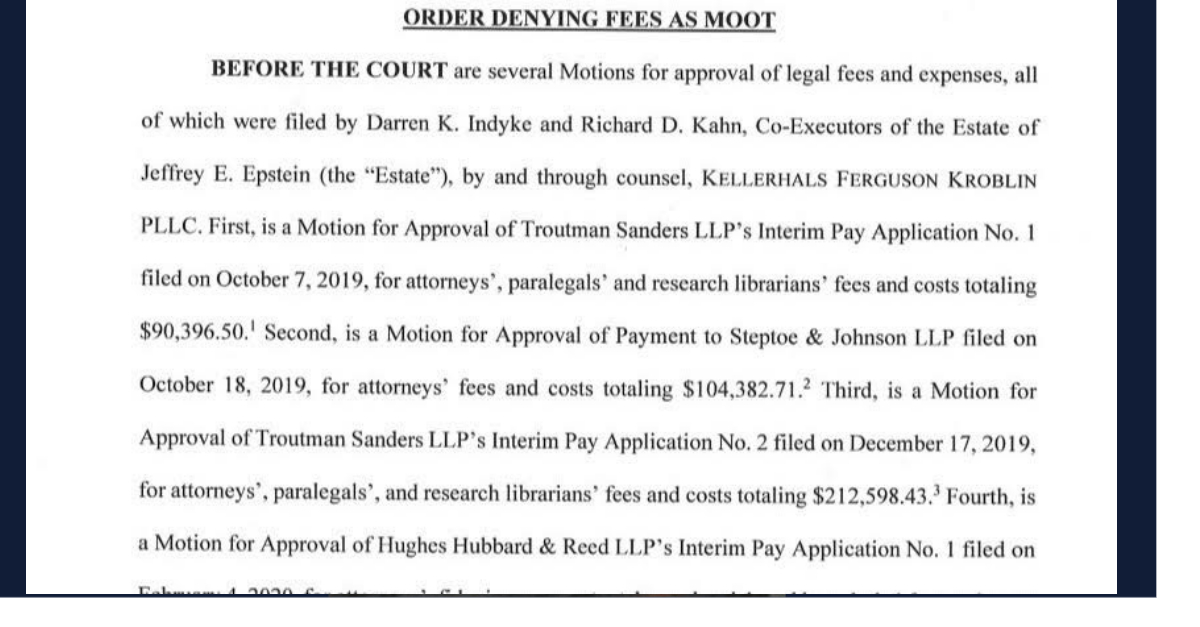
(court ruling from VI court above)
George has questioned a number of the estate’s expenses from the start, as has the judge. In December, over $500,000 in interim pay applications from Troutman Sanders and over $500,000 to Kellerhals Ferguson Kroblin were denied with prejudice.
The subject of George’s liens and the estate’s expenses are sure to be among the topics at the status conference scheduled for Wednesday.
Lawyers for Epstein, Indyke, Kahn and Ghislaine Maxwell will all gather in a Virgin Islands courtroom. A judge there designated their cases as complex.
Court officials closely monitor a complex case to ensure there is no undue burden on one person or group. Given the years of history and never-ending lawsuits being filed in this still mystery, it is little surprise that these cases would fit that mold.
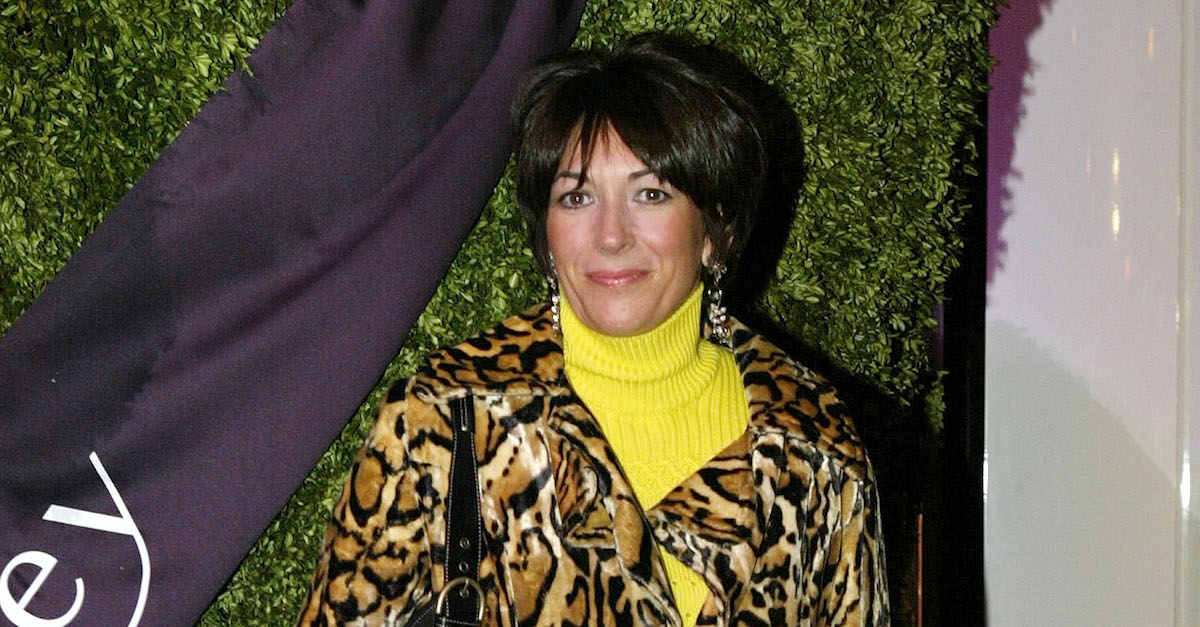
Ghislaine Maxwell (above in a 2003 Getty image) will virtually reunite with In dyke and Kahan tomorrow.
Maxwell, who is simply seeking money from the estate to cover legal bills, almost avoided that complex classification.
The judge wrote in his decision: “Although the Court agrees in general with Ghislaine and the Co-Executors that at first glance Maxwell does not appear to be complex, both sides neglected to mention (or intentionally omitted) that the Government has moved to intervene. In its motion, the Government maintains that Ghislaine is the subject of a local investigation concerning her role in Epstein’s alleged criminal activity. She has evaded attempts to serve her with a CICO subpoena. What’s more, the Government moved to intervene in Maxwell as of right and by permission, claiming an interest in the funds Ghisla[i]ne seeks to cover legal fees and expenses.”
George sued Epstein’s estate in 2020. Epstein was accused of using shell companies, charitable organizations, and even a modeling agency to traffic minor women to the Virgin Islands. He could hide them away on his private island while subjecting them to rape and sexual abuse, authorities said.
Thirteen months after that lawsuit was filed, an amended complaint accused Indyke and Kahn of being crucial members of the Epstein enterprise. Neither has been accused of criminal wrongdoing, and both deny the allegations of the civil proceedings.